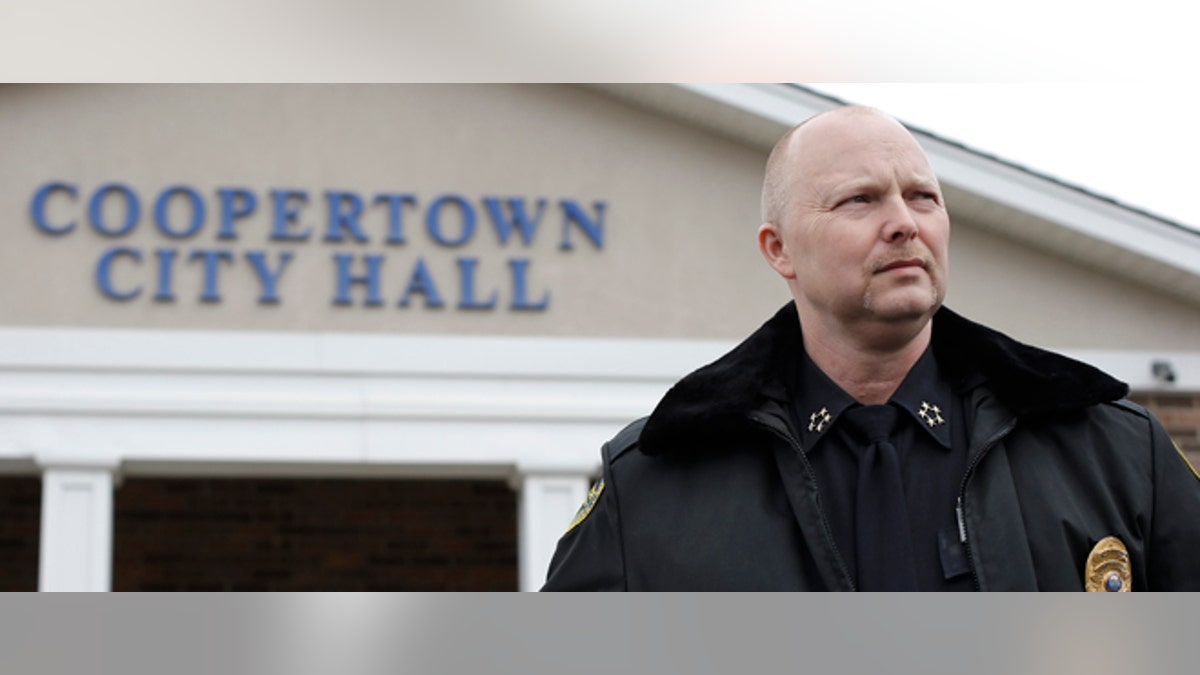
This Feb. 13, 2013 photo shows Coopertown, Tenn., Police Chief Shane Sullivan at the Coopertown City Hall. The department was disbanded for several months last year after an officer was recorded using a racial slur to describe a black motorist. Sullivan, hired in Nov. 2012, is counting on using a lie-detector test to keep racists off his tiny police force. (AP Photo/Mark Humphrey) (AP2013)
COOPERTOWN, Tenn. – A police force in a small Tennessee town employed polygraph tests to monitor new applicants for racist sentiments.
Law enforcement experts say the polygraph approach is unusual, though some departments use the devices for other purposes during the application process. Others try to root out bias in other ways. One polygraph expert warned that lie detectors can't accurately predict racism for reasons that include people's inability to recognize their own racism.
Coopertown Police Chief Shane Sullivan said he doubts racists will even apply for the force if they know about the tests.
"I think the polygraph will definitely keep these people from applying," the 39-year-old chief said.
And he believes the policy is working, because he says it's already discouraged some applicants. "I've told a couple of ones about the polygraph who have not called me back."
Sullivan took over the department in November, becoming the 11th chief in as many years. He was hired on the heels of a series of police scandals that for a few months left Coopertown with no police at all. Years before that, a mayor was voted out of office after the local prosecutor accused him of racism and running a notorious speed trap.
The rural community of about 4,000 people that is 95 percent white earned a reputation as a notorious speed trap, with about a third of its revenue coming from speeding tickets handed out by city police during the former mayor's tenure.
The new chief intends for his lie detector idea to help clean up the Coopertown's image. Candidates are required to answer whether they have ever committed a hate crime or a race-based crime.
"It doesn't ask if you've ever made a racist remark or slur," the chief said. Nor does the test ask people if they are prejudiced against any ethnic or religious minority.
Sullivan, who has taken the lie detector test himself, said he's hoping to establish a professional police department that can eventually provide 24-hour service seven days a week. Right now, he doesn't have the staff to police the town around the clock and leaves those duties up to the sheriff's office. He's already hired two police officers, both of whom have passed the polygraph, and he wants to add more. The department's budget is about $250,000 this fiscal year, Sullivan said, and the chief makes $41,000.
Bob Peters, a spokesman for the American Polygraph Association, said asking about factual matters is a better approach than using subjective questions about prejudice or racism. He says a polygraph can't accurately predict whether someone is racist.
"There might be people whom I might think have racist attitudes but they might not think so," said Peters, whose association has established best practices for use of the polygraph.
Peters says the new chief is using the best approach, and some voters are applauding him.
"I am very pleased with Chief Sullivan and the effort he is making to create a sound and secure police department for Coopertown," said Valorie Buck, chairwoman of the Coopertown Community Development Committee.
Malik Aziz, national chairman of the National Black Police Association, said the best way to keep bigots from being cops is through extensive background checks.
Based on reporting by The Associated Press.
Follow us on twitter.com/foxnewslatino
Like us at facebook.com/foxnewslatino
